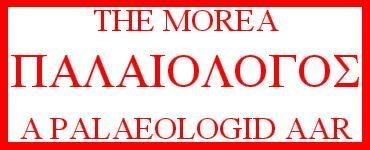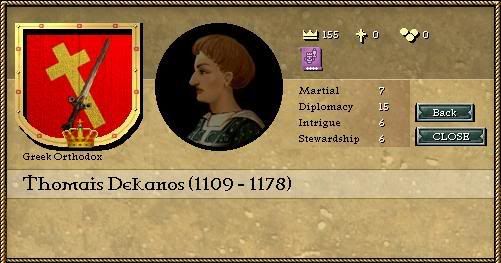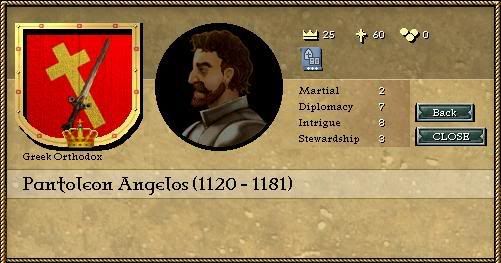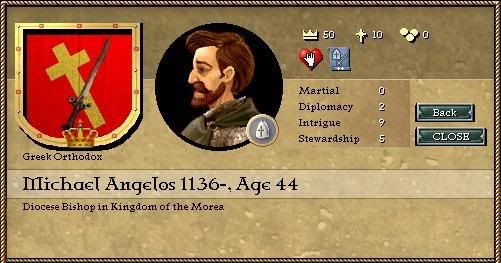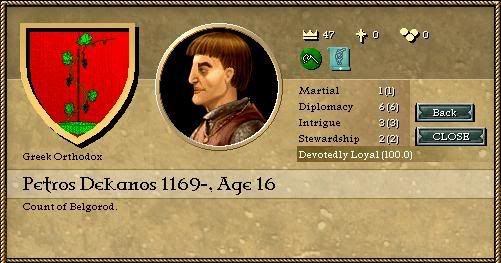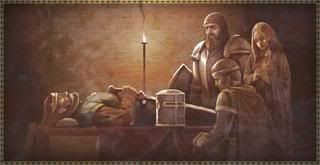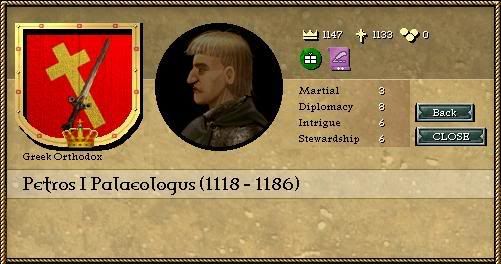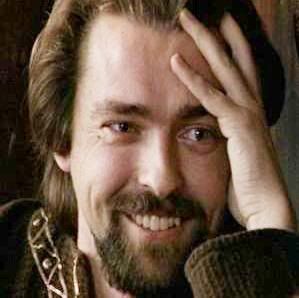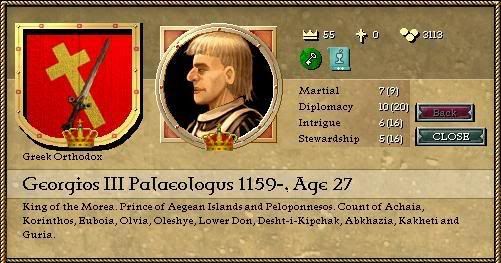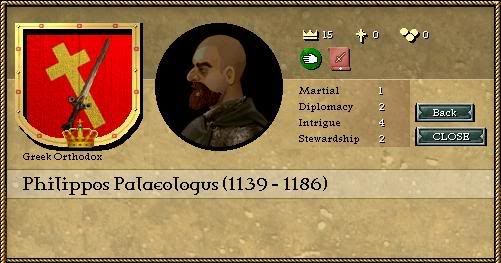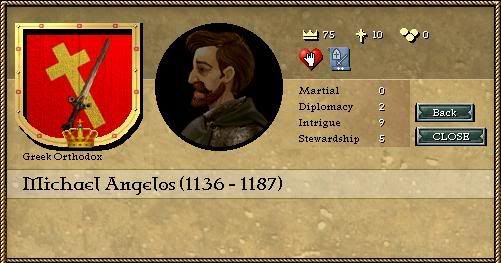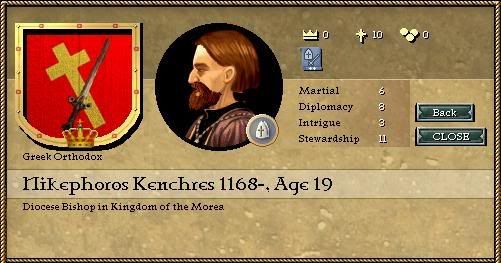"But my liege, what you speak of is ludicrous!" Theophilus said as he followed his lord, Count Konstantinos Dekanos of Bari, down the main hall of the castle towards the armoury.
"And just why is that?" asked the Count.
"My lord, you are speaking of a single county rebelling against an entire kingdom! You cannot hope for Bari to survive alone against the wrath of the Morea!"
They had entered the armoury by now, and Konstantinos snapped his fingers twince. He held his arms outstretched, and waited for his servant and friend to put the breastplate on.
As Theophilus brought the breastplate to the Count, Konstantinos answered, "My grandfather, the Blessed Alexios, swore to defend the King to the death. Can I do less?"
"But sire," insisted Theophilus as he tightened the straps to hold the armour in place, "King Konstantinos II is dead. Petros is our King now."
The Count tutted, "Theophilus, how little you understand. I refuse to recognize that man as King. He murdered Konstantinos II, and bullied Patriarch Pantoleon into crowning him. He has destroyed the Knight-Guard. And his new fortress, Petra, what arrogance to name it after himself!" He then looked at his friend, "Helmet."
Theophilus bowed, went over to get the Count's helmet, and as he returned with it he said, "I understand your reluctance to serve Petros, sire. But still, Konstantinos II wasn't a man worth dying for. You know I don't agree with Captain-General Gregorios' decision to lead his men to slaughter for the King. I know the legacy of your great ancestor, but I believe that not even the Blessed Alexios could bring himself to die for Konstantinos II. And besides, Konstantinos II is dead now. You don't need to die for him!"
Once his helmet was on, the Count looked back at his friend. Theophilus was slightly frightened by the appearance. Count Konstantinos did not use traditional Greek helmets. Being in Italy, the count had adopted some of the local armour. His helmet was that of a Catholic knight, covering his entire face, with only two small slits for the eyes, and a few small breathing holes near the mouth. When the Count spoke, his voice had a metallic ring to it, "I would not hold myself as a man if I did not fight for what I believed in."
Theophilus knew there was no sense arguing with his Count. Being a Dekanos, the Count was naturally stubborn. Once he had set his mind to something, there was no turning back. The servant wondered how this family had been able to survive, when even family squabbles led to bloodshed. He was remembering, ofcourse, the murder of Blessed Alexios' first son, Alexios the Younger, at the hands of a man payed by Blessed Alexios' own cousin, Isaakios. Indeed, there had been many similar instances throughout the history of the Dekani.
The Count, being pleased with the fit of his armour, then took his belt, tied it around his waist, took his sword, sheathed it, and picked up his shield. He then left the castle, with Theophilus following close behind.
As they left the keep, Theophilus saw around them the entire army of Bari, 1,250 men. They were all armed, and as the Count came into view, they cheered with a loud roar.
Count Konstantinos raised his right hand and they quieted down for him. "Brothers!" he began, "The time has come to fight once again!"
More cheers from the men. When again they had quieted, the Count continued, "The man who dares to call himself our King is a usurper! The Dekanos family had never tolerated Usurpation! You will remember how my grandfather, the Blessed Alexios, dealt with potential usurpers in the Inheritance Wars. Now I shall do the same! We shall topple this man from his throne, and exile his line from this land! We shall bring back the Imeretians, the line of Ermenegildo Palaeologus! For Prince Mikhael, in his old age has sired a son! Their line is ready to take the throne! Now you may be wondering how only we few can do this? We can't. But, if we make an example here and now, more will join us, and with their support, we can restore unto the Morea the pride, dignity, and traditions which Petros has stolen from us!"
The men began cheering louder than before. Inside his helmet, Count Konstantinos smiled. He looked up to the sky, and said, "Grandfather, I hope I can make you proud."
_______________
As the sun broke over the horizon on the morning of September 30th, 1176 Count Konstantinos Dekanos breathed in the morning air. There was nothing quite like the feeling of waking up in the middle of a military camp, surrounded by men ready to fight and to die at your command. There was a light mist hovering over the ground, and as the Count walked through the camp, he seemed not to disturb the mist at all.
As the count looked around the camp, he saw that most of his men were still asleep. They seemed so peaceful in their sleep. He smiled. How he loved these men. They were more than just his soldiers, his servants. They were his brothers, his sons. He loved each of them as though they were family. This thought brought to mind his two little sons back at the castle.
His eldest son had been born the same day that Petros Palaeologus had murdered Konstantinos II. How sadly ironic that the Count had chosen to name his first son Petros. Had he known was was happening that very day, he would have chosen any other name over Petros. His second son had a name which did not bear disgrace in this day and age: Nikephoros. They were both strong lads. He knew that they would one day make Blessed Alexios proud.
He was disturbed from his musings by his ever-loyal friend and servant, Theophilus, who said, "Sire, I have returned."
The Count nodded. "What have you learned during the night, Theo?"
"The forces of the Prince of Calabria," Theophilus began, "number as many as we do, perhaps slightly more."
Konstantinos shook his head, "That my own nephew would fight against me! That twelve year-old little brat! Does he not understand what being a Dekanos means? He isn't leading his army, is he?"
Theophilus shook his head, "No, sire. As you said, he is only twelve. The army is led by the Regent of Calabria, Ioannes Megenos."
"We will crush them," the count said. "Wake the men. Blood shall spill this day."
_______________
The two armies spent most of the morning maneuvering into position. It was about 11 in the morning when the battle actually commenced.
Count Konstantinos surveyed the field from his horse. Ioannes Megenos had brought mostly heavy infantry, while the Count of Bari had mostly light infantry. Usually, this would spell disater for Konstnatinos. But it had rained heavily last night, and the field was thick with mud.
The Count dismounted, drew his sword, and led his men onwards.
The Regent of Calabria, not being trained in military matters, ordered a full advance against the army of Bari.
About half way across the field, his men began to become bogged down in the mud.
This was the moment Konstantinos had been waiting for! He ordered a charge, and his light infantry followed him with fury into the melee.
After moments of battle, Konstantinos signaled for a trumpet blast. This was the sign for his cavalry to flank the enemy. The Barian horsemen rode around and struck the Calabrian infantry in the rear, where there was less mud. But the Calabrians had all been focused on the melee up front, and many were slain in the initial charge.
The sudden realization that they were stuck and surrounded disheartened the Calabrians. They soon broke, and tried to flee the field. But many were cut down as they fled.
Ioannes Megenos had not been so fortunate. He had fallen to the cavalry charge, and when the battle was over, many of the Barian soldiers danced and sang victory songs around his corpse.
There was a loud cheer from the Barian army. They felt invincible. There was nothing on earth that could stop them...



